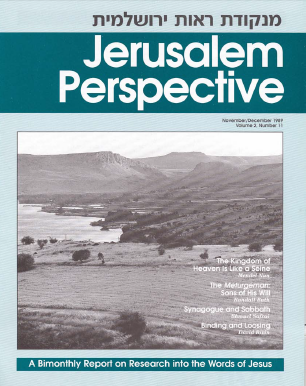Question received from a reader in Pasadena, California, U.S.A that was published in the “Readers’ Perspective” column of Jerusalem Perspective 23 (Nov.-Dec. 1989): 2, 14.
I appreciate your publication [JP] as it usually presents complex issues in a way the average person can understand. However, I feel uneasy about all the textual criticism you are doing. Do the scholars of the Jerusalem School agree with Bultmann that the Gospel accounts are not historically accurate but were added to and changed by later redactors, and that one needs to get behind these myths to understand the real Jesus?
David Bivin responds:
Both the Jewish and Christian members of the Jerusalem School of Synoptic Research take very seriously the Gospel accounts. In 1926 Rudolf Karl Bultmann wrote, “I do indeed think that we can now know almost nothing concerning the life and personality of Jesus, since the early Christian sources show no interest in either, are moreover fragmentary and often legendary; and other sources about Jesus do not exist.”[1]
I do not agree with Bultmann in this, nor do I share his view that the miracles of Jesus are merely literary devices or myths to convey some central moral or ethical theme. Bultmann insisted that it is impossible to reach the historical Jesus through the Gospels, but the Jerusalem School’s whole approach to the Synoptic Gospels contradicts this. I believe that not only is it possible to see and understand Jesus from the Gospels, but that we can even see him better when we read the Gospel accounts through the eyes of their first Jewish readers.
The most serious handicaps generally suffered by Christian New Testament scholars studying the words of Jesus are a lack of fluency in Mishnaic Hebrew and an unfamiliarity with the teachings and practices of Jesus and his Jewish contemporaries. A great deal that Jesus said and did has been distorted because the Church has grown unacquainted with its Hebraic roots. Since 1921, when Bultmann published the first edition of his influential Die Geschichte der synoptischen Tradition (History of the Synoptic Tradition), the Church and its academic institutions have taken a wrong turn in viewing the Gospel stories primarily as mythology.
However, I believe there is abundant evidence suggesting that Jesus’ sayings were recorded soon after his death—and in Hebrew, the language in which they were probably spoken. Consequently, I begin my study of the Gospels with a different set of assumptions than Bultmann and his followers, and I am able to take a much more optimistic view of our ability to recover accurate information about the Jesus of history.

- [1] Jesus and the Word, trans. L. P. Smith and E. H. Lantero (London: Charles Scribner’s Sons, 1934, 1958), 14. The German original reads: Denn freilich bin ich der Meinung, das wir vom Leben und von der Persönlichkeit Jesus so gut wei nichts mehr wissen können….” (Jesus [Berlin: Deutsche Bibliothek, 1929], 12). ↩































































































